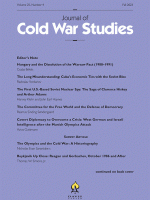The Committee for the Free World and the Defense of Democracy
This article provides the first comprehensive examination of the U.S.-based advocacy group the Committee for the Free World. Founded by Midge Decter in 1981, the CFW constituted a key foreign policy branch of the neoconservative movement in the late Cold War. The article traces the motivations for the CFW's establishment, activities, position within the neoconservative movement, and relations with the Reagan administration.
The CFW was launched simultaneously in New York and London with roughly 400 members from the US, the UK, Canada, West Germany, France, Italy, Israel, Argentina, and Australia. Its members hailed from the worlds of politics, journalism, art, academia, and think tanks. The group sought to make the defense of democracy a core component of U.S. foreign policy. To the CFW, this was mainly about the defense of Western democracies against communism rather than democracy promotion in authoritarian states.
Announcing the CFW to the world, Decter stated: "we are persuaded that the struggle for freedom may in the end be won or lost not on battlefields but in books, newspapers, broadcasts, classrooms, and in all public institutions where the determination to remain free is enhanced or undermined."
By tracing the CFW's vision for defending democracy, the article unearths a key intellectual lineage for the more active democracy promotion agenda that would become a key guiding principle for U.S. foreign policy in the post–Cold War world.
DIIS Experts


